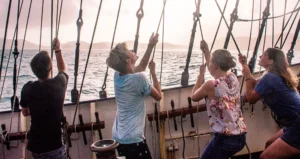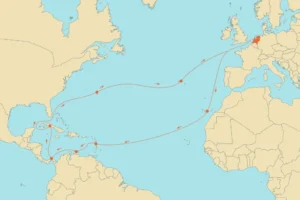School at Sea: interview with captain Samuel Dubois
While preparing for the next batch of youngsters leaving for the Caribbean on the three-masted Thalassa, insurer EOC interviews captain Samuel Dubois. ‘We can do a lot as human beings, but the sea is still boss.’
Captain Dubois (1985) can now be called an ‘old hand in the business’, as this year is his tenth time at the helm of the Tall Ship. In all those years, he has experienced countless interesting situations, because it is obviously quite a task: piloting a class full of motivated but young participants safely across the ocean and instilling seafaring discipline.
Can the captain of the Thalassa briefly introduce himself?
‘Of course. My name is Sam Dubois and I have been sailing for School at Sea since 2014. The first two years as mate, then as captain. I was lucky enough to meet the right people, and organiser Monique Touw then asked me for that role. A godsend. As for my education, in high school I initially focused on physical education and sports. Then I took a preparatory year of mathematics and went to the Higher Naval College in Antwerp. After a serious sports accident, I decided to follow my heart. I went to nautical college in Enkhuizen, a more practical training for sailing, and then sailed on all kinds of ships: the Morgenster, the Regina Maris, the Tecla and now the Thalassa.’
What attracted you to sailing?
‘Sailing was a passion for me from childhood. My first adventure was a crossing to England when I was about 16 years old. My uncle, with whom I sailed competitively, had sold a boat and it had to go to Ipswich. Whether I wanted to come along? At some point on the trip I lay down to sleep, but after half an hour I was asked to do the sail change. The moment I walked out, a three-master sailed past. That was so impressive, it was a revelation: “So it can be done!”. That summer I took part in the Tall Ship races and the next summer holiday I started working as a sailor.’
You have been involved with SaS for a long time.
What makes it so special?
‘As soon as everyone gets on board and you’re out of the harbour, something happens. You suddenly rely on each other. That is the most powerful tool of School at Sea. In similar projects on a mountain, forest or desert, you can theoretically leave at any time. At sea, you can’t, you can’t leave. We can do a lot as humans, but the sea is still the boss. So you have to solve your problems. That takes a lot of getting used to at first for the participants, but they find out that it is also nice to take responsibility for yourself and the group. Our society is quite patronising, on board it is very different. You have a problem, you have to deal with it and the whole team takes care of it. Once they get that, everything runs smoothly.’
 ‘I really see them grow and it happens very quickly. In the beginning, there are always some participants who treat the ship or each other disrespectfully. Just like at school, they stick chewing gum under tables. The difference with school is that here they don’t get away with it. I only have six months with them, so I set clear boundaries and address them immediately about unwanted behaviour. That also has to do with safety. This does shock them, but afterwards I am told that it is nice that it is so clearly set. It’s a different structure than in society. No “yes, but”. I sometimes read pieces from former School at Sea participants on LinkedIn to the effect: “I only now see what the teachers there have meant to me.” Former participants also regularly come to help maintain the Thalassa in their spare time. That says something about the bond you build with each other and the ship.’
‘I really see them grow and it happens very quickly. In the beginning, there are always some participants who treat the ship or each other disrespectfully. Just like at school, they stick chewing gum under tables. The difference with school is that here they don’t get away with it. I only have six months with them, so I set clear boundaries and address them immediately about unwanted behaviour. That also has to do with safety. This does shock them, but afterwards I am told that it is nice that it is so clearly set. It’s a different structure than in society. No “yes, but”. I sometimes read pieces from former School at Sea participants on LinkedIn to the effect: “I only now see what the teachers there have meant to me.” Former participants also regularly come to help maintain the Thalassa in their spare time. That says something about the bond you build with each other and the ship.’
A key moment on the voyage are the ship takeovers
How do these work?
‘At these moments, we literally leave the ins and outs of the Thalassa to the youngsters. The first ship takeover happens as soon as we arrive in Dominica, after about two months of travel. Everyone has to build a CV and drop by for an interview to apply for a role: mate, captain, machinist, baker, chef in the kitchen… For three hundred to four hundred nautical miles, depending on the weather forecast, they then take over the ship. The official crew really steps back and is only ready to intervene if things go wrong. It is amazing to see how a group of 15- or 16-year-olds manage this. Even complex manoeuvres. Or they prepare insane meals. The respect they have for each other then. And that’s only because they are given a certain responsibility. That’s what School at Sea is all about for me.’
Have schoolchildren changed in mentality or attitude in those 10 years?
‘I feel that society has become a little more individualistic. More time passes nowadays before the group finds cohesion. Young people are there for each other, but it remains superficial for a while. Actually, something has to happen on board first that makes an impact. Someone having to go home because of illness or severe homesickness, or exceptionally bad weather. Something you have to go through together, that builds a bond. Only then does change occur. As an organisation, we constantly weigh this up: we actually want to take care of everything perfectly, but in doing so you also take away the unexpected things that can actually be effective. It is searching for the right balance.’
Embarkation week starts on 19 October 2025.
What happens and how exciting are those first moments?
‘When I look back over the past decade, those first moments mainly revolve around the final goodbye the young people say. From their parents and their old life. Everyone who goes along has obviously worked hard for this and had a long time to prepare, but there is always tension. This is dealt with in many ways. Some cannot sleep the nights beforehand, or, on the contrary, suddenly do not dare to go on board when the time comes. On that first day, there is laughter and there are tears. Some pull the cart, on the contrary, want to do too much right away. We as a crew keep that all together. And sometimes something happens that you didn’t see coming at all: for instance, someone once fell so much in love that they wanted to go home after a week’.
The journey takes six months, then you are home.
Do you have six months’ holiday then?
 ‘I have permanent employment on the Thalassa, but that definitely involves more than just captain’s work during the trip. Also think about the maintenance involved, the repairs, the painting. School at Sea itself lasts six months, but preparation starts as early as September and maintenance continues well into May after returning in April. About eight months in total. In between, I do indeed have holidays, but don’t forget that the rest of the time I don’t have a free weekend! However, I must admit that during School at Sea, the quiet moments are also hard to enjoy.’
‘I have permanent employment on the Thalassa, but that definitely involves more than just captain’s work during the trip. Also think about the maintenance involved, the repairs, the painting. School at Sea itself lasts six months, but preparation starts as early as September and maintenance continues well into May after returning in April. About eight months in total. In between, I do indeed have holidays, but don’t forget that the rest of the time I don’t have a free weekend! However, I must admit that during School at Sea, the quiet moments are also hard to enjoy.’
Suppose you are thrown overboard and washed up on a desert island.
What will you do?
‘Coincidentally, on Panama we organise a survival on a desert island as standard, so I can answer that question very easily. The first and most important thing is always make sure you have clean water and a fire. If there are other people there; count that everyone is there. And then you just make the best of it while it lasts. You’re in survival mode first, then you see how you get off the island.’
Finally, do you have anything you would like to pass on?
‘I would like to stress very clearly that School at Sea is for everyone. Offering a fundraising programme gives participants tools to raise the required amount themselves. There is also the SaS fund that you can call on to help with funding. EOC contributes to this every year as a sponsor, which we are very happy about. It helps us to make and keep the programme accessible. Everyone is welcome at School at Sea.’
Source: EOC Sailing Friends.

